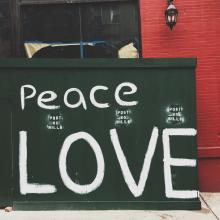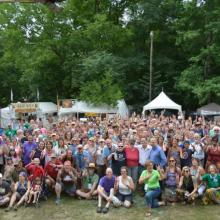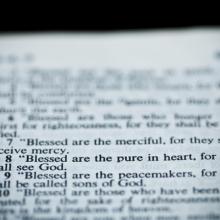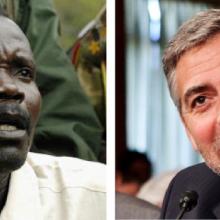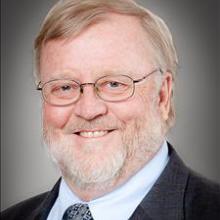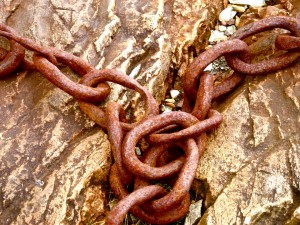peacemakers
“Blessed are the peace lovers,” for they shall be called righteous — on the right side. They will be known for what they will not do, for being against war, for preferring peace, for not fighting, for staying out of conflicts.
But that is not what Jesus said.

Image via Gimas / Shutterstock.com
A starting point is recognizing the truth that war is never noble or courageous. Noble and courageous acts occur during war, but war itself is always the ultimate human failure and must never be portrayed as anything else. War is the expression of our worst impulses — killing and maiming one another while destroying the many good things we've built together.
In the same-sex marriage discussion, people cite 2,000 years of church history to support their suspicions of affirming theology. But this same history offers plenty of examples of healthy theological shifts that actually counter tradition. Healing on the Sabbath went against thousands of years of history. Replacing circumcision with baptism went against thousands of years of history. Even the Reformation went against 1,500 years of history, with the Reformers’ claim that they better understood the church fathers than the church did. History reveals that the church is always learning, always engaging in a re-examination of core values.
This summer I had the distinct privilege of being asked to serve as the Liturgical Coordinator for the Wild Goose Festival held in Hot Springs, N.C. The festival is a time and place of celebrating the “intersection of Spirit, Justice, Music, and the Arts” that began a few years ago. As such, liturgies abound. Some of them were rather traditional. The Episcopal tent, for example, held Compline services every night. They also broke out of the mold and hosted a songwriter circle and an agape feast. The Goose is like that. Ask the Methodists about the beer tent. Oh, and the Baptists had a coffee shop.
People break from the mold a little. There was a Eucharistic liturgy where a blacksmith literally hammered a rifle into a farm implement. It was an unusual Eucharist, to be sure, but beautiful.
SOME PEOPLE (I was one) will initially read this book to learn what it was like for the author to grow up in Jonah House, a faith-based community of peacemakers in Baltimore, with internationally known activist parents Phil Berrigan and Liz McAlister providing strong ballast when not spending time in prison for nonviolent civil disobedience. I wanted to know what formed the vibrant Frida Berrigan, with whom I work on the National Committee of the War Resisters League. I learned about Frida’s birth in a basement, about Jonah House folks reading the Bible before days of work as house painters or being arrested at protests, about Frida and her sibs watching television on the sly, about the nitty-gritty of dumpster-diving at Jessup Wholesale Market.
But I learned much more from It Runs in the Family, and the “more” is at the heart of this fascinating book, which blends memoir, parenting advice, and connections between the questions parents ask about their children and the questions we should ask about the world. Phil Berrigan and Liz McAlister taught their children about the woes and warfare of the world; in this book, Frida also gently teaches us, while describing both her life as a child and her life as a mother to Seamus, Madeline, and stepdaughter Rosena.
WHEN I FOUND out years ago that most early Pentecostal denominations had been committed to nonviolence—including the Assemblies of God, the denomination of my heritage—I thought it was about the dumbest thing I’d ever heard. Not kill for the United States of America (or any country)?
Then I stumbled upon the Pentecostal Evangel, a weekly magazine of the Assemblies of God (USA), which published these revealing words during World War I:
From the very beginning the [Pentecostal] movement has been characterized by Quaker principles. The laws of the Kingdom, laid down by our elder brother, Jesus Christ, in the Sermon on the Mount, have been unqualifiedly adopted, consequently the movement has found itself opposed to the spilling of the blood of any man.
This was new to me. I was reared in a U.S. Pentecostalism that taught intense loyalty to the United States and deep pride in combatant military service. Where did this hidden history of Pentecostal nonviolence come from?
Reading other early accounts of Pentecostal peacemaking prompted me to further examine where it had gone and whether it could re-emerge. It would also challenge and deconstruct my understanding of Christianity.
MY HEART WAS broken when I got the news on a Sunday in September: All Saints Church in Peshawar, Pakistan, had been attacked by two suicide bombers just after the Sunday service, as worshippers filtered out of the sanctuary. Eighty-five people were killed, including 34 women, seven children, and two Muslim police officers there to provide security. Later reports said the bombers were Sunni extremists.
In 1976, I was honored to start Youth for Christ in Peshawar. There were few Christians in this area near the Afghan border; Peshawar was not and is not a big town. Undoubtedly, some of the adults in and around the church when it was bombed were people I had met decades earlier.
News of the bombing confounded my memory of Peshawar 38 years ago. Religious plurality then was not perfect, but it was in great contrast to today. Christians, though few, served the Lord with some freedom. Youth for Christ held open-air rallies in the park, amplified by public-address speakers, with young people singing Christian songs with Bible messages to be heard by anyone within earshot. No security was needed, and truth be told both Muslim and Christian youth were in the audience and the choir.
The start of the second Gulf war in 2003, and subsequent military actions, changed everything. Reports say the church bombing in Peshawar was in retaliation for U.S. drone strikes that killed innocent men, women, and children, along with suspected terrorists, in that part of Pakistan. Peshawar is strategically located on the border with Afghanistan, not far from the famous Khyber Pass and only about 125 miles from where Osama bin Laden was killed.
IT CAME TO pass in the summer of ’72 that many young people gathered in Dallas for Explo, a week of training for Christian witness sponsored by Campus Crusade for Christ. ... And among those present in Dallas were some messengers of peace—some post-Americans calling themselves the People’s Christian Coalition, and a few sons of Menno sent by the Mennonite Central Committee, who had also come to witness for their Lord.
The messengers of peace set up their booths along with many others and distributed their literature. And many people came by. Some looked and smiled; some looked and frowned. Some said “right on” and “we need that” in response to posters saying “blessed are the peacemakers” and “swords into plowshares”; but others said “praise the Lord, God will take care of wars, all we need is to win people to Christ.”
IN HER JEWISH school in Montreal, Ronit Avni learned the tragic history of her people. Her Canadian mother and Israeli father had met in the ’60s when her mother was living in Israel and working as a folk singer, often performing for Israeli troops. Her older sister was born in Tel Aviv, but the family settled back in Montreal in the mid-’70s before Ronit was born.
Not strictly religious but committed to the values of Judaism, Ronit couldn’t help but ask probing questions as she listened to the stories of the birth of the modern state of Israel in 1948. Am I hearing the whole story? How do Palestinian perspectives differ from what my educators and community leaders are teaching? How can we transform this situation from a zero-sum equation to one that respects the dignity and freedom of all?
Years later, having graduated with honors from Vassar College with a degree in political science after studying theater at a conservatory in Montreal, Ronit trained human rights advocates worldwide to produce videos as tools for public education and grassroots mobilizing.
By the time I met Ronit a few years ago, she had narrowed her worldwide focus to the Israeli-Palestinian conflict, where her heart was most deeply drawn. She is the founder and executive director of Just Vision, an organization dedicated to increasing media coverage and support for Palestinian and Israeli efforts to end the occupation and conflict without weapons of violence.
During the last several years, my engagement in the Holy Land has been significantly shaped by Ronit. Her film Encounter Point, about Israelis and Palestinians who have lost family members, land, or liberty to the conflict yet choose forgiveness and reconciliation rather than revenge, gave me hope that peace can emerge from pain.
“Blessed are the peacemakers, for they will be called children of God.
“Blessed are those who are persecuted for righteousness’ sake, for theirs is the kingdom of heaven.
“Blessed are you when people revile you and persecute you and utter all kinds of evil against you falsely on my account. Rejoice and be glad, for your reward is great in heaven, for in the same way they persecuted the prophets who were before you.”
Social Justice Reflection:
Jesus was a peacemaking, blessed child of God, but he also was an “other.” Reviled and persecuted, he was the paperless son of displaced immigrant parents. The prophetic iconoclast. That guy who hung out with those people, the type most modern leaders would not associate with, except for a photo opportunity at a Thanksgiving Day soup kitchen. Let us remember on Sunday when we celebrate his resurrection, that Jesus was crucified because he was an outsider whose way of doing things scared and angered the powers-that-be.
We have become a nation that loves to “other” people. We point out their differences as reasons they cannot be trusted, as evidence that they take too much from the rest of us or threaten our well-being. We have lengthy, bitter debates about allegiance and legitimacy, and we reject those who do not meet our standards. We know who belongs, and the others need to clear out and leave us alone with our worldly possessions, our rules, and our way of doing things.
Activists from Colombia’s indigenous Nasa people continue to make headlines — but there’s far more to their peacemaking than the occasional story that makes the U.S. news. Here’s part II of the interview I did with two Nasa Indigenous Guard members, Manuel and Herman, in Cauca, Colombia, last August. The interview took place a month after an earlier round of violence: a bus bomb, suspected to be from the FARC, that went off in the town of Toribío, killing three and wounding more than a hundred in July 2012.
Sojourners: What’s it like to be in the Indigenous Guard?
German: Being an Indigenous Guard is very risky. Obviously there are moments of conflict in which you know what you’re facing -- then there are moments of apparent calm, but calm can switch into situations of risk very quickly.
George Clooney and others were arrested on the steps of the Sudanese embassy last week to call attention to the violence in South Sudan. The actor-activist, along with Jon Prendergast, testified before the Senate Foreign Relations committee and conducted a series of media interviews to explain the situation in South Sudan, the world’s newest nation.
I applaud Clooney for using his star power to shine a light on the violence in South Sudan. Now that we see the problem the question for us is: what does this situation require of me personally?
Similarly, when we watch the Kony 2012 video that, for all of its flaws, informs people about the crimes against humanity of Joseph Kony and the efforts to bring him to justice, the same question arises.
The world is full to the brim with tragedy. We see the violence in Syria, people protesting their government are killed by their own government. We see world leaders who cannot come to consensus about the right thing to do.
What action will at once end the violence, protect the people, and depose an illegitimate government while not increasing violence in a complicated and volatile region of the world?
From Sojourners CEO Jim Wallis' eulogy at Scott Kennedy's funeral last weekend:
"Oh Lord, Lord, Lord…. This is a hard one.
You know why we are all gathered here today—Because Scott Kennedy, your good and faithful servant, has always brought us together—to do good things in the world: Necessary things, visionary things, courageous things, and often hard things. But they were things that must have warmed your heart, because they were the things that make for peace.
Jesus told us. ‘Blessed are the peacemakers, for they shall be called the children of God.’ And Scott brought us together, time and time again, to be those peacemakers and thus, really, to be your children—by doing what we were supposed to do.
And now, Scott is with you….and has likely heard you say something like, ‘Well done good and faithful servant.’ But we miss him terribly, and we weren’t ready for this. We just thought we would always have him.
Scott never brought us together for himself; it was never about him, but always about being peacemakers for the sake of other people. But today we gather for Scott. He has brought us together once again, and what a crowd it is—both here and online all around the world. We are all Scott’s peacemakers...."
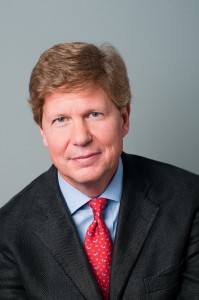 The puzzle here is not that readers of the Bible would tilt toward the political left. That, for me, as well as for thousands of other American evangelicals, is self-evident. Jesus, after all, summoned his followers to be peacemakers, to turn the other cheek, to welcome the stranger and to care for “the least of these.” He also expressed concern for the tiniest sparrow, a sentiment that should find some resonance in our environmental policies.
The puzzle here is not that readers of the Bible would tilt toward the political left. That, for me, as well as for thousands of other American evangelicals, is self-evident. Jesus, after all, summoned his followers to be peacemakers, to turn the other cheek, to welcome the stranger and to care for “the least of these.” He also expressed concern for the tiniest sparrow, a sentiment that should find some resonance in our environmental policies.
No, the real conundrum lies in the subtitle the editors of Christianity Today assigned to Franzen’s article, which was titled, “A Left-Leaning Text.” Adjacent to a picture of a Bible tilted about 45 degrees to the left, the editors added the subtitle: “Survey Surprise: Frequent Bible reading can turn you liberal (in some ways).”
The fact that anyone should register surprise that the Bible points toward the left should be the biggest surprise of all.
American Christian Zionism is pushing the U.S. government to support Israeli policies that our international friends find immoral and illegal.
We have come to believe that Christian Zionism underwrites theft of Palestinian land and oppresses Palestinian people, helps create the conditions for an explosion of violence, and pushes US policy in a destructive direction that violates our nation's commitment to universal human rights.
We write as evangelical Christians committed to Israel's security. We worry about your support for policies that violate biblical warnings about injustice and may lead to the destruction of Israel.
Two long pieces this weekend described "one hell of a killing machine," and "the dark matter
I have gotten so used to stories of violence in the news every morning that I confess they don't move me as much as they should, or used to. Today: Three straight days of killing in Karachi with 42 dead; Syrian tanks shelling the city of Hama, where more than 100 people have died since Sunday; U.N. peacekeepers killed by a landmine in Sudan; daily deaths in Libya; bombings in Baghdad and assassinations in Kandahar. It goes on and on.
David Cortright's "Finding the Way Out" (March 2011), about why it's time to end the war in Afghanistan, was excellent and timely with one exception -- his appeal to the just war doctrine.
